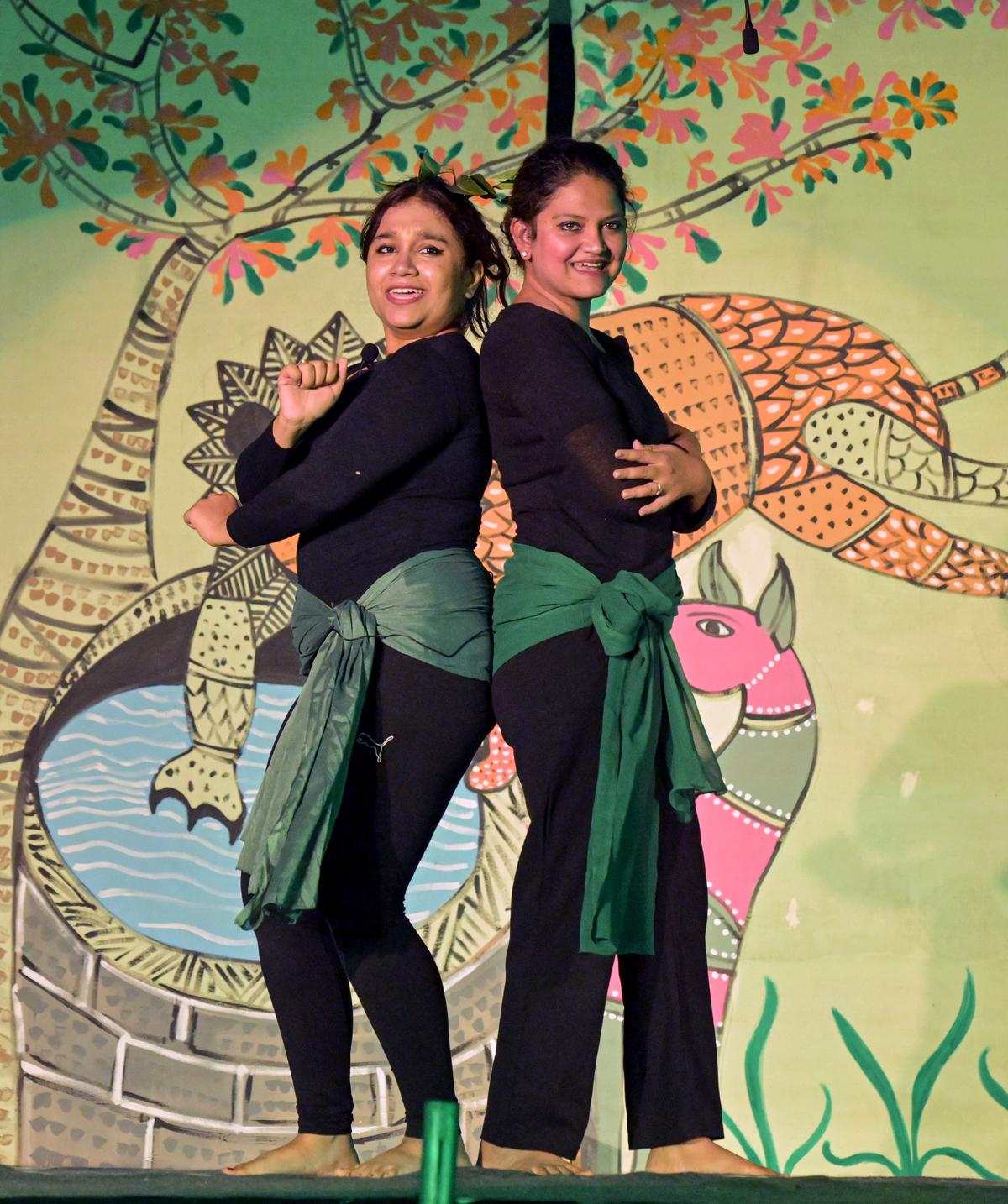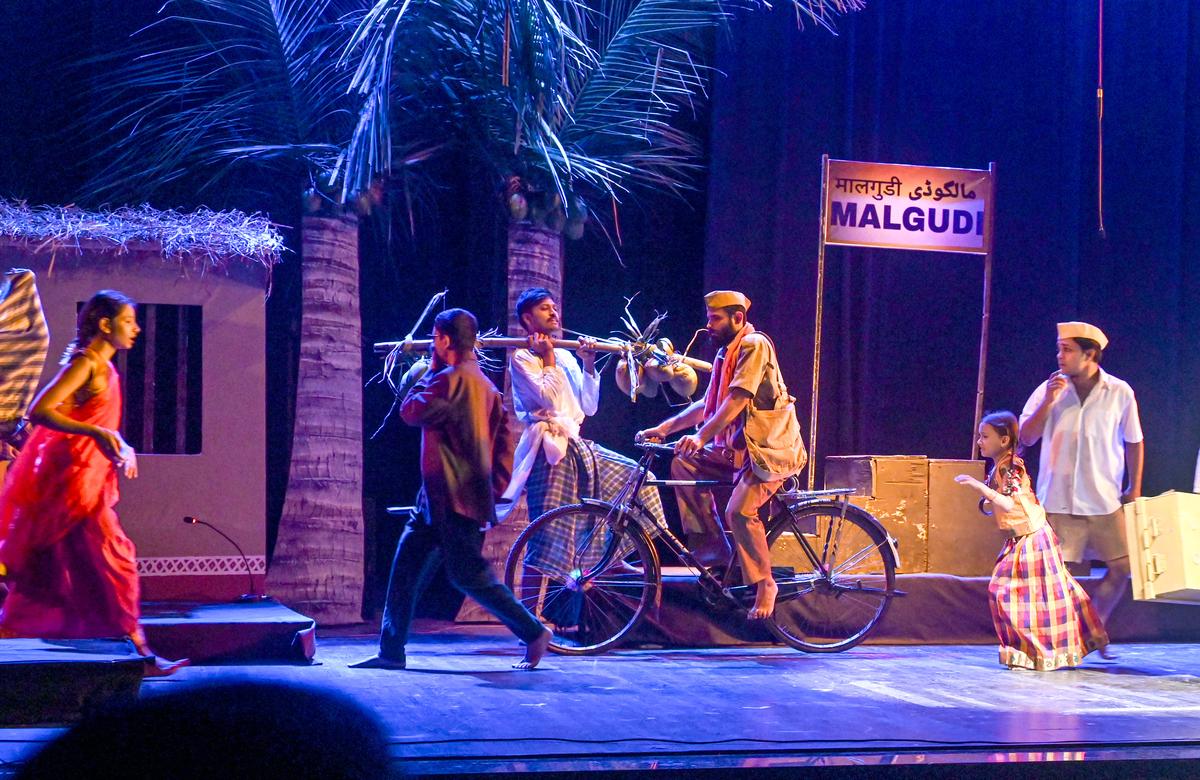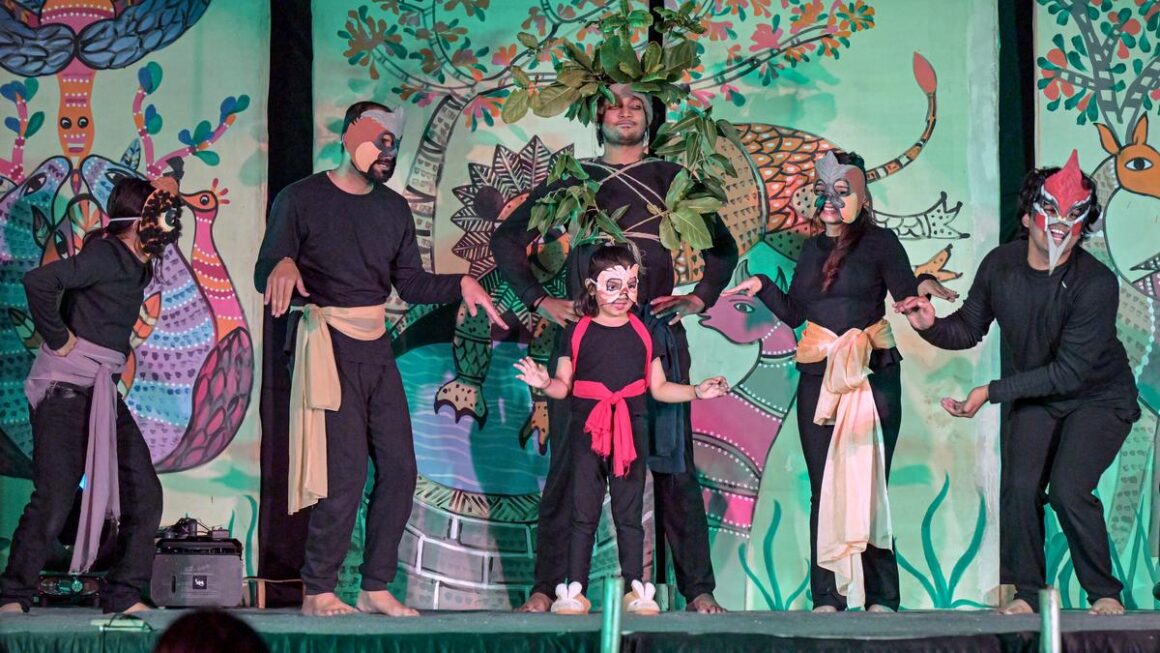The stage is minimalistic yet vibrant, adorned with a towering tree and a backdrop depicting a moonlit forest. Dim blue and silver lights wash over the set, creating an ethereal atmosphere. With flowing white hair and dark eyes, Betal, the ghost, dangles from a tree. His eerie yet playful laughter echoes through the hall, capturing the attention of every child in the audience.
King Vikramaditya, dressed in warrior attire with a jewelled crown and sword, strides confidently onto the stage. The actor exudes an air of determination, his deep voice booming as he addresses the ghost: “Betal, I have come to fulfil my promise. Tell me your riddle, but beware — this time, you shall not trick me!”
A scene from Vikram and Betal play by Swatantra Theatre during the Vizag Junior Lit Fest in Visakhapatnam.
| Photo Credit:
SPECIAL ARRANGEMENT
Betal begins narrating his story, gesturing dramatically as he weaves the tale. His animated expressions and shifting tones pull the audience into the story. At a crucial juncture, Betal pauses and turns to the audience: “What do you think, children? Between King Rupsen and Virvar, whose sacrifice is greater? Or is there a deeper lesson to be learned here?”
The spotlight pans over the audience as enthusiastic hands shoot up. Children eagerly share their thoughts, debating the morals of the story.
This was how the Vizag Junior Literary Fest concluded in Visakhapatnam recently with Swatantra Theatre, a Pune-based theatre group, performing participatory theatre – an approach in which the actors interact with the public based on a real problem.
The theatre group has been weaving magic by staying rooted to traditional narratives while exploring innovative ways to engage audiences. “The live interaction inherent in theatre creates a profound connection between performers and audiences, evoking emotions and sparking conversations that digital mediums often fail to achieve,” says Dhanashree Heblikar, one of the founders.
Established in Pune in 2006, Swatantra Theater has directed and produced several plays based on the themes of national integration and humanity. Founded by Abhijeet Choudhary, Yuwaraj Shah and Dhanashree, the theatre group endeavours to foster a connection between theatre and society while nurturing promising talent and helping connect the new generation to the magic of the stage.
Recreating classics

Members of Swatantra Theatre group performing Panchatantra Tales at the inaugural day of the Vizag Junior Literary Fest at Hawa Mahal in Visakhapatnam.
| Photo Credit:
KR Deepak
One of Swatantra Theatre’s standout productions this year is the recreation of Badal Sirkar’s iconic play ‘Spartacus’. The group is revisiting this timeless classic with a contemporary lens, exploring themes of freedom, rebellion, and justice. “The iconic play was performed on the occasion of Hindi Divas this year. It was an equally transformative experience for us where we learnt about the techniques of the third theatre that was introduced by Badal Sirkar in the 1960s where the actor is a tool that seeks to expose the process by which oppression occurs,” says Dhanashree.
Known for its minimalist set design and immersive acting style, Swatantra Theatre aims to reintroduce Sircar’s powerful narrative to modern audiences, ensuring the play’s relevance in today’s socio-political landscape.
Last year, the group recreated the R K Narayan’s beloved tales from Malgudi Days at the Vizag Junior Theatre Fest.

A scene from Malgudi Days , a play by Swatantra Theatre.
| Photo Credit:
KR Deepak
For the first time, Swatantra Theatre has embarked on a unique initiative to introduce theatre to UPSC passouts. Recognising the importance of emotional intelligence in administrative roles, theatre has been included for the first time as one of the modules in the IAS training programme. Swatantra Theatre group will be conducting a training session for the young bureaucrats in December. The session includes basic introduction to theatre, workshops on voice modulation, body language, and improvisation, culminating in a performance of the satirical play ‘Taj Mahal Ka Tender’. “This humorous production, centred on the inefficiencies of bureaucracy, is a light-hearted critique on the bureaucratic process while showcasing the creative potential of theatre as a tool for personal and professional growth,” says Dhanashree.

Dhanashree Heblikar of Swantantra Theatre.
| Photo Credit:
SPECIAL ARRANGEMENT
Dhanashree also highlights how theatre has expanded its reach through modern platforms, workshops, and collaborations, making it accessible to diverse audiences, including youth. By collaborating with schools and institutions like IITs, the group has introduced the art form as a powerful means to enhance emotional intelligence and foster teamwork.
Theatre can be a thereupuetic medium for neurodivergent children. Dhanashree recollects an experience with a six-year-old borderline autistic child who comes to their theatre workshop regularly. “Over a period of time, we saw him express himself in ways that his parents never experienced before. On the day of the play, we had a backup person to perform his character; but he took us by surprise with his confidence with which he performed. That’s because he understood the importance of his character and that the play would not be complete without his role. It was beautiful to observe how the child bloomed beautifully through team work,” recollects Dhanashree.
Theatre with a Purpose
For Swatantra Theatre, staying connected to cultural roots while innovating for contemporary audiences is not just an artistic endeavour — it’s a mission. “We do three big festivals for adults and two children’s festival every year. We have also been performing street theatre at marathons to make the medium popular,” says Dhanashree. This year, the group has also ventured into the corporate theatre space with a collaboration with Tata group. “At its core, corporate theatre emphasises ethics, recognising the importance of integrity, accountability and empathy in creating a harmonious and productive work culture. The first workshop was conducted in Pune in November this year,” she adds.
Whether recreating the revolutionary spirit of Spartacus, empowering civil servants with theatrical tools, or engaging children in timeless tales, the group exemplifies the transformative power of theatre. Dhanashree adds, “Theatre is not just about performance; it’s about creating a connection, fostering empathy, and making a difference.”
Published – November 28, 2024 06:55 pm IST


Leave a Reply